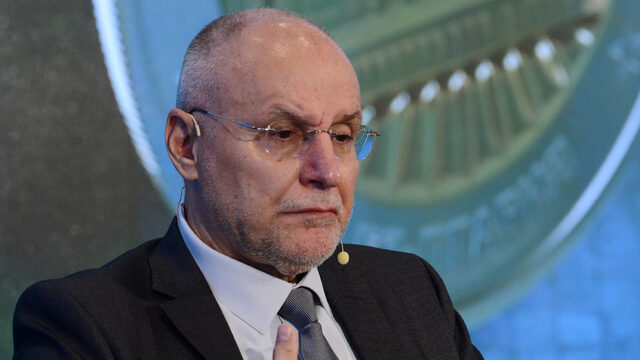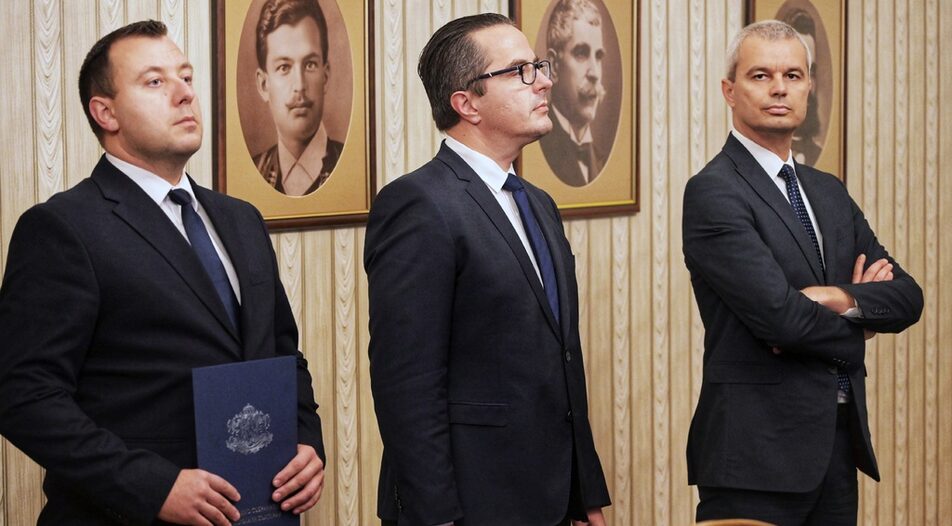In recent years, the topic "for" and "against" the adoption of the euro by Bulgaria has rather resembled a football match, with economists and politicians falling in one of the two respective camps and brooking no counter-argument. That is why analyses on the subject, even the most well-intentioned and balanced ones, are doomed to failure.
Each side goes as far as to claim that any arguments in favor of the adoption of the common currency amount to "treason against the national interest and transferring the last bits of Bulgarian monetary sovereignty to Frankfurt and Brussels" (for the euro-opponents) or, on the contrary, that euro-skeptics are in effect Kremlin agents or lobbyists of local oligarchs.
Predictably, a draft analysis on the topic, which for some reason entered the public domain without being finalized and approved by the board of the central bank (BNB), had a similar fate. The first party to access it was the anti-European Vazrazhdane and, with some help from BSP (which recently toys more openly with eurosceptic ideas, too), made a huge deal out of it. "The introduction of the euro will have a devastating effect: death for the economy, death for public finances, death for private finances, death for people's savings and incomes," Vazrazhdane leader Kostadin Kostadinov dramatically concluded two weeks ago. In reality, the 130 pages in question do not predict the death of anything, although they do focus much more on the risks than the benefits, but without giving a final assessment.
BNBs internal clashes
The serious political storm, however, never happened despite Mr Kostadinov's statements that his formation would not allow the eurozone entry and would work for a referendum. Just a week earlier, parliament overwhelmingly gave a mandate to expedite the country's goal of adopting the euro by 2024. From the rostrum, central bank governor Dimitar Radev had to enter explanatory mode and reaffirm the BNB's official position - namely that the central bank does not believe Bulgaria is ready for the eurozone and needs further work if it is to become its 21st member.
The rupture, however, echoed in the BNB itself, in whose governing council there is also a (more muted) running battle between euro-critics and euro-optimists. Formally, there is no institution or person in Bulgaria, occupying a key position, who is openly against the euro adoption. However, this does not imply unanimity. Within the BNB itself there are also varying opinions on the issue, although the institution has so far formally come out with a monolithic position on the subject.
But in insider circles it is widely known that the long-standing sub-governor Kalin Hristov of the bank, whose portfolio is essentially the currency board, is skeptical about Bulgaria joining the euro. Governor Radev has subtly hinted at his irritation with Mr Hristov in a series of interviews, while Mr Hristov himself has hinted at his skepticism in an interview for BGlobal magazine. Here he cites errors in the ECB's monetary policy and outlines his thesis that countries that have joined without meeting the criteria, such as Greece and Italy, have experienced huge economic upheavals (and, by extension, Bulgaria would, too).
Dissent within the central bank is definitely not helping the country on its path towards the euro. The situation is exacerbated by the fact that three of the seven members of its governing council (including both Mr Radev and Mr Hristov) have expired terms, which seriously undermines its independence and ability to make commitments.
To top it off, all this drama is happening on the home straight towards the Eurozone, where Bulgaria is expected to take clear action and show willingness and readiness to adopt the euro on January 1, 2024. Moreover, informal signals from Frankfurt and Brussels are positive, encouraging the Bulgarian authorities to seize the moment.
There is no perfect currency
In an attempt to reconcile the two warring factions, let's still start by conceding that a perfect monetary regime does not exist. Throughout history, various forms of fixed and floating exchange rates as well as monetary unions have been successful (or failed) in a variety of ways. So neither the current currency board model nor the euro are a panacea and both carry pluses and minuses.
In the report, the BNB experts point out that Bulgaria's current monetary design serves to discipline public finances. This is a valid claim. What remains somewhat understated is that the maintenance of the currency board is itself not without flaws and defects. At the very least, despite its quarter century of operation, it may at some point prove unsustainable. Its stability depends on good management of the country's foreign exchange reserves and public finances, which, even if it has been a fact over the years, is not a given. Recently, even in its presence, fiscal discipline has been shaken and a deeper global recession coupled with populist governance could lead to pressure on the board and/or even calls for its abolition.
Sovereign lev or receipt for the euro
One of the favorite polarizing points that creates tension is the loss of sovereignty. For the euro's critics, the abandonment of a national currency represents Bulgaria's irreversible renunciation of independent monetary policy. For its supporters, on the other hand, this loss of sovereignty happened already in 1997. Since then, the lev has been a de facto receipt for the euro at a ratio of 1.95583, Bulgaria imports monetary decisions from Frankfurt almost directly, and with eurozone entry Sofia will even have some voice in the decision-making.

BNB experts (thankfully) don't have extreme positions. What they say is that, in the event of some catastrophic scenario, Bulgaria can currently modify or abandon the board, whereas if it adopted the euro that option would disappear. The exact nature of that cataclysm is not described, but we can infer they are alluding to something of the magnitude of a breakup of the eurozone itself.
Here, however, one can only hypothesize about the devastation unleashed by any potential collapse of such a monetary and political union. And it is hard to say to what extent formal monetary sovereignty could help Bulgaria to mitigate the effects on its economy which is in any case heavily tied to that of the rest of the EU, by untying the lev or tying it to something else. And, of course, this imaginary euro-apocalypse may never arise, and in the meantime benefits measured in higher credit ratings, the opportunity to improve institutions and to finance business and government more cheaply will be missed.
To catch up as part of the pack or as a sidekick
Less trenchant opponents of the euro say that Bulgaria is not ready to join in terms of income levels, prices and productivity. The BNB's analysis broadly supports this thesis, believing that monetary policy is mostly inappropriate for the Bulgarian economy and therefore poses risks, notably incurring bubbles and higher inflation in the growth phase. In general, this argument can be reduced to "first catch up with the Europeans and then think about the euro".
This logic rather prevails in central European countries with floating exchange rates such as the Czech Republic, Hungary and Poland, which use their monetary policy to stimulate growth. However, in the case of Bulgaria's fixed exchange rate, this argument carries much less weight. The ECB's monetary policy is already being imported quite directly, so joining the eurozone will not bring much change. BNB itself also states that membership of the monetary union is not determinant for the speed and level of real convergence.
Joining is no shoo-in even if we want to
Finally, the question of Bulgaria's accession to the euro area is, of course, not up to Sofia alone. The country has to ask for a convergence report from the EC and the ECB to establish that the country meets the requirements, and then get the political blessing of all members. Currently, Bulgaria does not meet the inflation criterion, or the long-term convergence interest rate (which is far below the benchmark), and it is debatable to what extent Bulgaria has met its reform commitments from when it entered ERM II in 2020 Add to that the lack of a regular government with a clear mandate to give any commitments plus the political instability and frequent periods without a functioning parliament, and simply moving the necessary legislative changes forward can be a problem.
Irrespective of the final outcome, it should now be painfully clear that neither the board nor the euro can be a panacea. Formal entry into monetary union is a kind of stamp of quality that brings positives for attracting investor confidence. Closer integration with Brussels and Frankfurt provides an opportunity for qualitative improvement of institutions and regulators. Ultimately, however, building them up, ensuring their independence and purging them of corruption is Bulgaria's responsibility alone. Similarly, ensuring rigorous fiscal discipline, improving the business environment, and safeguarding the efficiency of public institutions are incumbent on all Bulgarian politicians. They should not be carried out because of the threat of sanctions from the market or from Brussels but instead because they are, all too self-evidently, vital prerequisites for Bulgaria's sustainable future.
In recent years, the topic "for" and "against" the adoption of the euro by Bulgaria has rather resembled a football match, with economists and politicians falling in one of the two respective camps and brooking no counter-argument. That is why analyses on the subject, even the most well-intentioned and balanced ones, are doomed to failure.
Each side goes as far as to claim that any arguments in favor of the adoption of the common currency amount to "treason against the national interest and transferring the last bits of Bulgarian monetary sovereignty to Frankfurt and Brussels" (for the euro-opponents) or, on the contrary, that euro-skeptics are in effect Kremlin agents or lobbyists of local oligarchs.












